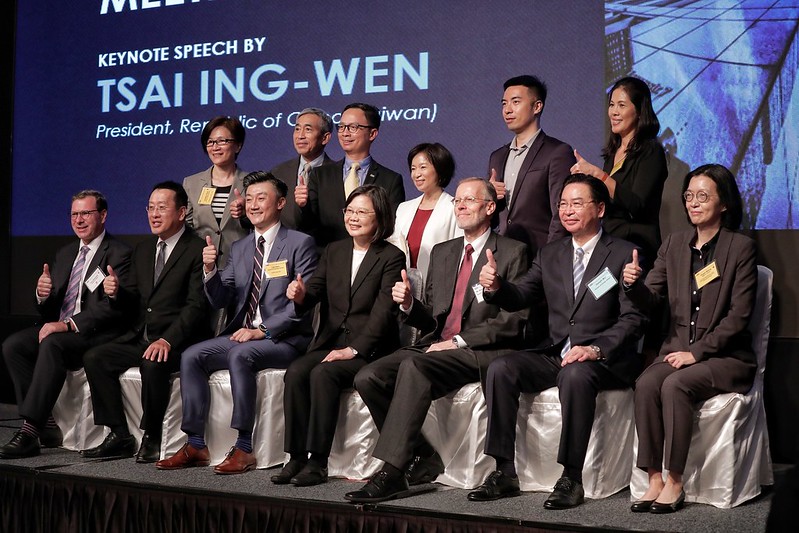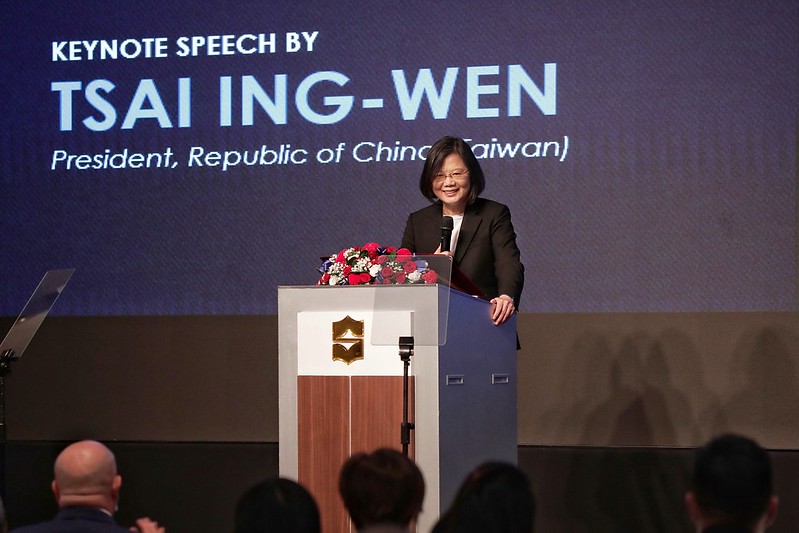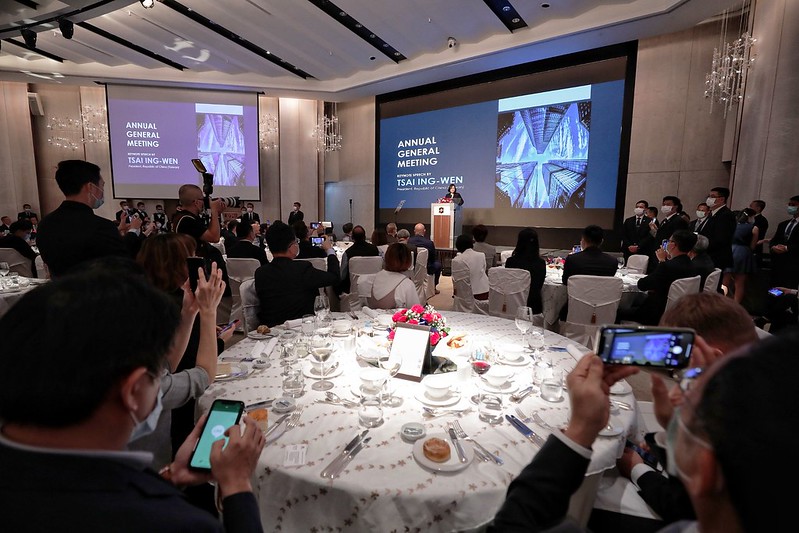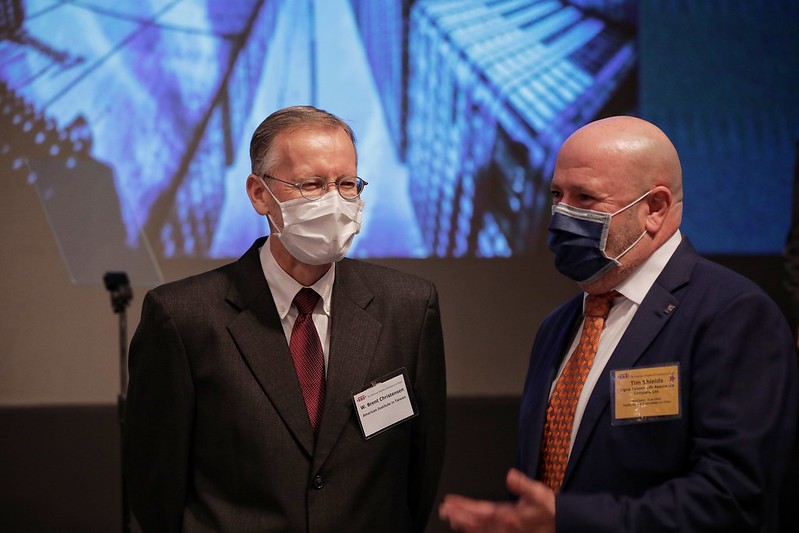News & activities
 News releases
News releases
While attending the 2020 American Chamber of Commerce in Taipei Annual General Meeting at noon on November 17, President Tsai Ing-wen expressed hope for the signing of a bilateral trade agreement (BTA) between Taiwan and the United States. Such an agreement would further allow the two countries to capitalize on the complementary nature of our industries and create even more business opportunities that can ultimately build an even stronger economic partnership between Taiwan and the US, she said.
A transcript of President Tsai's remarks follows:
This is my second time attending the American Chamber of Commerce in Taipei's annual general meeting as President of Taiwan. I want to begin this talk with sincere congratulations to the American Chamber of Commerce in Taipei (AmCham Taipei) for your announcement of the name change to the American Chamber of Commerce in Taiwan (AmCham Taiwan). Chairperson [C.W.] Chin shared this wonderful news with me when we met in August.
The name "AmCham Taiwan" is a true reflection of its membership in Taiwan, and I am happy to bear witness to the announcement here later today. I believe your organization will play a crucial and significant role in the development of Taiwan's economic partnership in the future.
Due to the COVID-19 pandemic, many countries have been forced to close their borders, restrict movements in their communities and shut down their schools. All this caused a global economic downturn. The second and third waves of infections in Europe and the Americas further exacerbated this adverse trend. Taiwan, on the other hand, has persevered through this grave challenge. We were not only able to effectively combat the spread of the coronavirus through the collaboration of our government and citizens; recent data also showed that Taiwan's economy has held up very well amidst this outbreak.
I am proud to say that in the third quarter, Taiwan's economic growth rate was 3.33%. It remains the highest among the Four Asian Tigers. And, the main reason for this strong performance was that Taiwan did not have to enforce any lockdown. Company offices and manufacturing plants continued to operate as normal, enabling Taiwan to secure a stable economic environment to supply the global economy with what it needs. In all, Taiwan was able to ride out the worst global economic downturn because of this versatility.
I am also pleased to see AmCham's Business Climate Survey and Taiwan White Paper this year recognizing Taiwan's economic prosperity, and that almost 71% of AmCham's member companies showed increased optimism about Taiwan's economic outlook in the next three years. This bears evidence to Taiwan's economic resilience in this uncertain time. We are looking forward to continuing this positive trend, as my government works proactively to deepen economic and business partnerships with our global partners to secure mutually beneficial outcomes.
The United States has always been an important economic partner for Taiwan. Taiwan's total trade with the United States in the first half of this year has exceeded that of India, making Taiwan the ninth largest trading partner and the 11th largest export market for the United States. Taiwan also has a close investment partnership with the United States. There were several major investment announcements from American companies this year. For example, this September, General Electric (GE) and CTCI Corporation announced their collaboration to supply power generating units to the Hsinta and Taichung combined cycle power plants. We hope, through this collaboration, Taipower can further stabilize the supply of electricity for Taiwan while reducing carbon emissions, therefore, achieving balance between economic development and environmental protection.
Also this September, Google confirmed the plans to build its third data center in Yunlin County as part of the company's "Smart Taiwan" initiative. This initiative will provide training for Taiwanese businesses and students in digital marketing and a boost in IT infrastructure, making Taiwan the hub of interconnectivity and communications development in the Asia Pacific Region.
Just last month, Microsoft also announced its largest investment in Taiwan in 31 years and its plan to develop Taiwan into an "Asian Digital Transformation Hub". This endeavor is projected to generate at least 30,000 jobs. On the other hand, Taiwan Semiconductor Manufacturing Co. (TSMC), the world's largest and most advanced chipmaker, plans to spend USD$12 billion to build an advanced chip plant in Arizona. This is a decision that not only can address the US's national security concerns; it also helps in shifting more high-tech manufacturing to America. All these are examples of how close the economic relationship between Taiwan and the US is. I firmly believe, there will be more good news for Taiwan-US investments in the future.
In the past few months, we all observed the development of even closer ties between Taiwan and the US, under which, on the economic front, we are seeking new areas of cooperation. Under Secretary Keith Krach's visit in September exemplified the remarkable possibilities of Taiwan-US economic relations. During Under Secretary Krach's visit, he and I exchanged views on the Taiwan-US economic partnership. He also had fruitful discussions with many officials from my administration.
Now, we are diligently planning the "Taiwan-US Economic Prosperity Partnership Dialogue". And we hope, through this new platform, we can derive more opportunities of cooperation in areas such as the restructuring of supply chains, technology, infrastructure, and energy collaborations. Another encouraging development is the signing of the "Framework to Strengthen Infrastructure Finance and Market Building Cooperation" in September, with the launch of its virtual working meeting at the end of last month. With this framework, we will be able to further facilitate technical exchanges and information sharing for the purpose of catalyzing investments in infrastructure across the Indo-Pacific region and helping to secure resilient and sustainable supply chains of the future.
I have spoken a lot on the close partnership between Taiwan and the United States thus far. And, this very close partnership between Taiwan and the US can be made even stronger with a bilateral trade agreement. Such an agreement would further allow Taiwan and the United States to capitalize on the complementary nature of our industries and create even more business opportunities that can ultimately benefit both our countries. I want to take this opportunity to thank the members of AmCham Taiwan for paying careful attention to the progress of a BTA between Taiwan and the US. We sincerely appreciate your recommendation to the US government and members of Congress to encourage negotiating the agreement with Taiwan.
As a result, last month, more than 50 US Senators, in a letter addressing the US Trade Representative Mr. Robert Lighthizer, called for the start of formal negotiations for a BTA with Taiwan. Lastly, I want to extend my appreciation to AmCham Taiwan and the US-Taiwan Business Council (USTBC) for establishing the "US-Taiwan Bilateral Trade Agreement Coalition". Thank you very much for your staunch support.
Finally, I want to thank the organizer again for the invitation to join you all today. I want to thank every member of AmCham Taiwan for your contributions and support. Let us look towards an even stronger economic partnership between Taiwan and the United States.
Also in attendance were National Security Council Secretary-General Wellington Koo (顧立雄), Foreign Minister Joseph Wu (吳釗燮), AmCham Taipei Chairperson C.W. Chin, AmCham Taipei President Leo Seewald, and American Institute in Taiwan Taipei Office Director William Brent Christensen.












